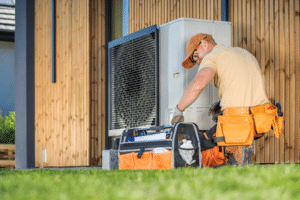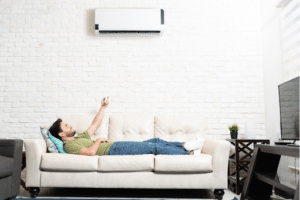Posted by admin on March 14, 2016

Check Your Air Filters
By checking your air filters you keep your system running properly and efficiently. So make it a point to check your air filters once a month and replace them as needed. In general air filters need to be replaced every 30 to 90 days but your environment can affect this.
If You Have an Outdoor Unit Keep It Clean
Outdoor air conditioning and heating units can easily be covered up by leaves, sticks, pollen, and other debris. By keeping your unit clean you increase its efficiency and help prevent damage due to blockages. Plus with better airflow the motor is less stressed which increases the unit’s lifespan.
Keep Vents and Registers Clean
Blockages in your vent system make your HVAC system less efficient which leads to longer usage cycles to keep the temperature under control. Not only does this wear your HVAC system down faster it also increases your power bill. So be sure your vents are clear of dust and debris and also make sure registers/grills are as well.
Listen For Odd Noises
Pings, bangs, and other odd sounds can be a sign something is wrong. Sometimes this something can be as simple as a blocked vent, a filter that needs changing, or a loose screw somewhere that needs tightening. By being aware that something is wrong you can perform minor HVAC maintenance before it becomes a much bigger problem.
Use Fans When You Can
One of the best preventive maintenance tips is to not overuse your system. Use fans to increase air circulation and keep cool on warm, but not necessarily hot, days. On chilly days wear a sweater before deciding to turn up the heat.
Keep the Thermostat at a Consistent Level
A bad habit many of us have is raising or lowering the thermostat to cause the unit to ‘kick on’ when it’s too hot or too cold. While nobody likes to be uncomfortable doing this puts more wear and tear on your unit’s motor which can shorten its lifespan.
A Note about Houses with More Than One Floor
Multi story houses have a reputation of being harder to heat and cool. While a larger building will certainly require more time and a bigger HVAC unit than a single story one there are ways you can make the process more efficient. Keep all vents on the 2nd floor open at 75 percent, make sure no vents are closed and that none are more open than others. This keeps the temperature even through the second floor.
As you can see there are several preventive maintenance and usage steps you can take to keep your HVAC system running efficiently and effectively. Doing so saves on repairs and keeps your system running better longer. However, be aware of when an issue is beyond your skill or comfort level. There is still HVAC maintenance and repairs that require a professional’s skill and experience. Always know when it’s time to consult an expert and remember you can get a free estimate before any work is done.


